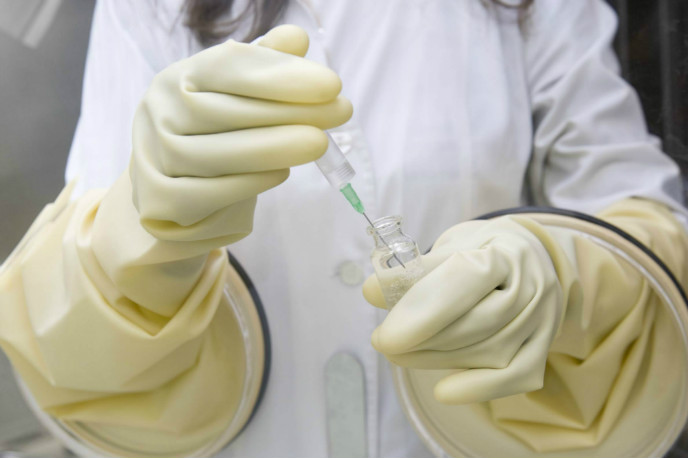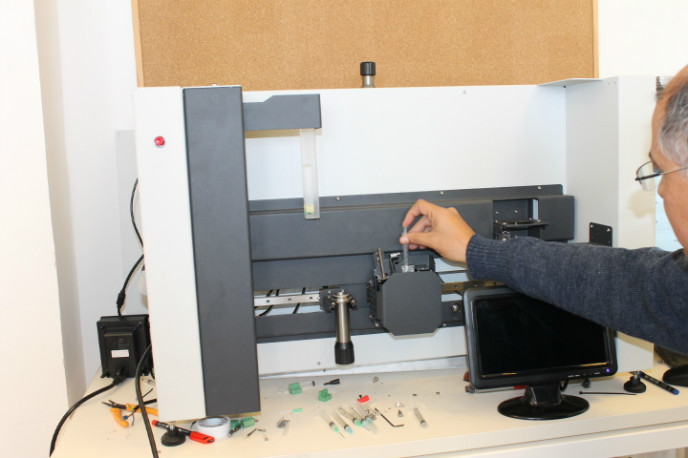Every time a drug is dispensed there is a risk of human error, and with that comes the risk of injury to the patient. In the case of radiopharmaceuticals for nuclear diagnostics and treatments, the technician dispensing the substance is also at risk.
The Israeli company RescueDose was founded to address this danger by revolutionizing the way liquid medication is prepared and administered, minimizing human contact and making the entire process safer for patients and medical professionals.
The Haifa-based company’s robotic dispensing system is already in use at the Nuclear Research Center in Soreq, which manufactures and distributes radiopharmaceuticals in Israel.
Technicians place vials of the drugs into the RescueDose unit and key in how much of each component is needed for a dosage. The system automatically adds the specified amounts to an attached syringe.
With interest coming from potential customers in Asia, Europe and North America, RescueDose is partnering with US-based ec2 Software Solutions to integrate its robotics with ec2’s BioDose medical software. Their goal is to produce a system that automates the entire nuclear medication-dispensing process, from calculating doses to administering the drug.
The partnership is funded by a grant of almost $2 million from the Israel-US Binational Industrial Research and Development (BIRD) Foundation, which promotes joint product-development collaborations between Israeli and American companies.
“In the US and worldwide, you already have the software infrastructure. We’re going to add the robotics so that during every step from prescription to patient, the dose is under inspection and time-stamped to assure that the nuclear elements have not decayed,” says RescueDose CEO and cofounder Gilad Einy.
Uniquely portable
One significant innovation is the portability of the RescueDose system, Einy tells ISRAEL21c.
“There are other robotic devices in the market, but they are large in scale. Soreq didn’t want big machines; they wanted a smaller, mobile system that could be stationed within their existing infrastructure.”
The Nuclear Research Center also is an investor in RescueDose, and is cooperating in evaluating the functioning of the system — the first commercial RescueDose installation — to help the company fine-tune future iterations of the product.
Indeed, the same technology can be integrated into general pharmaceutical dispensing operations, Einy says. Whether drugs are radioactive or not, pharmacists and technicians using a RescueDose unit can benefit from its features, including built-in electro-optics to catch mistakes before they reach the patient.
“If the syringe is not in place properly, or if the dilution isn’t correct, our vison-control system sees it and alerts the technician to make the appropriate correction,” says Einy.
As part of a national effort to eliminate workplace dangers in Israel, RescueDose is also collaborating with students of Dr. Nirit Gavish at ORT Braude College in Karmiel — an academic center focusing on engineering and cooperation with industry — to develop a process and algorithm for safer handling of any liquid substance in a laboratory, not just medications.
Looking ahead, says Einy, RescueDose hopes not only to expand its operations to Europe and China, but also to expand the scope of its systems into the areas of pediatric medicine, personalized medicine and non-liquid medication dispensing.
The company’s cofounder and medical director, Dr. Tal Or, directs the emergency department at Baruch Padeh Medical Center in Poriya. He originally hoped to design a better system for medicating children during trauma care, but he and veteran startup entrepreneur Einy decided to begin by addressing the risks involved with radioactive substances used in some 40 million testing and treatment procedures every year.
For more information, click here.
















